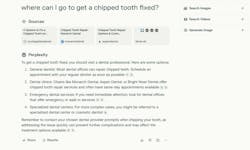Future-proof your practice: How dental GEO is changing patient search
Just when dental professionals were mastering the art of Search Engine Optimization (SEO), the digital landscape is evolving once again, thanks to the rapid advancements in Artificial Intelligence (AI). The new kid on the block, Generative Engine Optimization (GEO), is shaking up the world of online marketing. So what is it, you ask? GEO ensures your content is optimized for AI-driven platforms, making it more accessible and relevant for AI-generated search results.
It is a new frontier reshaping how patients find dental services online.
Let's explore the distinctions between SEO and GEO, examine their implications for dental practices, and provide actionable strategies to harness the power of AI in your marketing efforts to keep you ahead of the curve.
SEO vs. GEO: Understanding the differences
Search Engine Optimization (SEO) has long been the cornerstone of online visibility. It involves:
- Keyword integration: Embedding relevant search terms into your website content to rank higher on search engine results pages (SERPs).
- Backlink building: Acquiring links from reputable websites to boost your site's authority.
- Optimizing for search engines: Ensure your website ranks high on platforms like Google.
- User-driven clicks: Relying on users to click through search results to find your content.
- Technical enhancements: Improving site speed, mobile responsiveness, and overall user experience to meet search engine criteria.
Generative Engine Optimization (GEO), on the other hand, is an emerging strategy tailored for AI-driven platforms. It focuses on:
- Conversational content creation: Developing content that AI assistants can easily interpret and relay in natural responses.
- Structured data implementation: Using schemas and metadata to help AI accurately understand your information.
- Optimizing for AI responses: Ensuring your information is primed for AI-driven platforms that generate answers directly.
- Direct answer provision: Crafting content that directly addresses common patient queries, enabling AI to extract and deliver concise answers without the user needing to click through content.
AI-driven platforms
AI-powered search isn’t just the future—it’s already here, transforming how people find information online. Tools like Google Gemini, Perplexity AI, and ChatGPT amongst others are reshaping search by delivering instant, AI-generated answers instead of traditional search results.
All three are advanced AI assistants that process and generate human-like text, images, and even audio. For dental practices, they can help create engaging content, answer patient questions, and automate routine tasks—streamlining efficiency and improving patient communication.
To give you a better idea, we asked Gemini and Perplexity to find the best place to fix a chipped tooth. Take a look at the results below.
Example Gemini screenshot
Example Perplexity screenshot
As you can see, AI search engines respond in a highly intuitive, human-like manner, delivering precise answers in one step. Instead of sifting through multiple links, you get a well-structured response with all the key details upfront—saving time and effort.
How we search for information: SEO vs. GEO in action
Still confused? Let's illustrate the key differences using a real-world example of how a patient might look for emergency dental services.
How dental SEO works: traditional search behavior
Imagine you wake up with a severe toothache at 2 a.m. and need an emergency dentist. Here's how you would traditionally search using SEO-optimized content:
- Go to Google and type:
"Emergency dentist open now near me"
- Look at the search results (SERPs) and see a list of websites with relevant keywords.
- Click on a website that looks promising, usually one in the top three search results.
- Scan the website to check if they actually offer emergency dental care and if they're open.
- Look for a phone number or online booking option.
- Call the office to confirm availability and book an appointment.
In this scenario, SEO helps your dental website rank higher, but patients must navigate multiple steps to get the answer they need.
How Dental GEO works: The AI-powered search experience
Now, let's see how a GEO-optimized search works when a patient interacts with Google Gemini.
Example #1: Typing a question into Gemini
- A patient wakes up with a severe toothache and decides to search for help by typing their question directly into Google Gemini: Which emergency dentist near me is open right now?
- Gemini's AI-generated response: Bright Smiles Dental is open 24/7 and located 2 miles from you. They offer emergency dental services. You can call them at 555-1234 or visit their website for more details.
- The patient can then clicks the phone number to call the office or get directions without scrolling through multiple search results.
Example #2: Speaking to Gemini using voice search
- The patient asks Gemini's voice assistant instead of typing: Hey Google, who offers emergency dental services near me?
- Gemini Responds: The nearest emergency dentist is Bright Smiles Dental, located 2 miles away. They're open 24/7. Would you like me to call them for you?
- Patient responds: Yes, call them now.
- Gemini dials the number automatically, allowing the patient to book an appointment instantly—without ever visiting a website.
Key takeaways for dental practices
With AI-powered searches, patients get direct answers instead of clicking through traditional search results. This shift means dental practices must optimize their content for GEO, ensuring AI can easily access and deliver their practice information when patients need it most.
So how do I optimize my dental practice for GEO?
Potential patients may never find your practice if your content isn't set up for AI search engines. To stay competitive, consider these key adjustments:
- Create AI-friendly content – Write in a conversational, question-and-answer format that mirrors how patients speak to AI assistants. Adding an FAQ section with clear, concise responses helps AI easily extract and present your information.
- Optimize for local and voice search – Ensure your Google Business Profile is accurate and complete since AI often pulls information from local listings. Use long-tail, natural-language keywords that reflect how people ask questions out loud.
- Implement structured data and schema markup – Metadata helps AI understand and categorize your content, making it easier to feature in AI-driven search results.
- Enhance website performance – AI favors fast-loading, mobile-friendly websites with clear, well-organized content. Make sure your site is technically optimized for a seamless user experience.
- Leverage AI tools for marketing – Use AI-powered platforms to refine content, analyze patient inquiries, and track AI search trends. Social media also plays a role in AI discovery, so post AI-optimized content regularly.
- Stay ahead of AI trends – Keep up with advancements in AI-powered search and adjust your marketing strategies accordingly.
- Partnering with a dental marketing expert ensures your practice stays visible and competitive in this rapidly evolving landscape.
Implementing these strategies for your practice can maximize online visibility, attract more patients, and help you thrive in the AI-powered digital era!
Don't drop dental SEO for dental GEO: You need both!
As a dentist, your primary goal is to attract and retain patients. To do that in today's tech-savvy world, you must be visible to traditional search engines and AI-driven platforms. Here's why balancing SEO and GEO is essential:
- Broader reach: Some patients use conventional search engines, while others rely on AI assistants. Covering both bases ensures you don't miss out on either group.
- Stay competitive: As more practices adopt dental GEO strategies, sticking solely to SEO could leave you lagging.
- Enhanced patient engagement: AI can provide personalized, immediate responses, improving patient experience and trust in your practice.
How a dental marketing company can help
AI technology is evolving at breakneck speed. For busy dental professionals, staying updated can feel overwhelming. New tools, updates, and strategies emerge regularly, and integrating them effectively into your practice requires time and expertise.
This is where partnering with a specialized dental marketing company can benefit your practice:
- Stay updated: Marketing professionals stay abreast of the latest AI developments and understand how to leverage them to their benefit.
- Tailored strategies: They can create customized marketing plans incorporating dental SEO and dental GEO, ensuring maximum online visibility.
- Content creation: From blog posts to AI-friendly content, they handle the heavy lifting so you can focus on patient care.
- Utilizing advanced tools: With access to and knowledge of tools like Gemini and Perplexity, they can integrate these technologies to enhance patient engagement and streamline operations.
By collaborating with a dental marketing company, you ensure your practice keeps up with technological changes and thrives in an increasingly digital world.
Embrace AI: Your path to efficiency
AI is transforming not only how dental practices operate but also how patients search for care. By integrating AI tools, practices can automate routine tasks, personalize patient interactions, and enhance marketing efforts—ensuring efficiency and a seamless patient experience.
Take Annie, an AI-powered assistant that instantly answers patient questions, books appointments in real-time, and frees up staff to focus on more critical tasks. With AI handling administrative burdens, your team can dedicate more time to patient care.
Staying ahead as the digital landscape evolves requires adaptability and a forward-thinking strategy. Embracing both SEO and GEO ensures your practice remains visible and competitive in an AI-driven world. Partnering with a dental marketing expert can help you navigate these changes effectively, leveraging the latest AI tools to boost patient engagement, streamline operations, and future-proof your practice.
FAQ
Is dental GEO a passing trend, or will it be a long-term strategy?
GEO is here to stay. AI-driven searches are growing rapidly, and Google, Apple, and Microsoft are investing heavily in AI-powered search engines. As patients rely more on AI assistants for information, optimizing for GEO will be essential for staying visible in the digital landscape.
What's the first step to implementing GEO for my dental practice?
Start by evaluating your current content—are you answering common patient questions in a way AI can easily understand? Then, update your website with clear, structured answers, optimize for voice search, and implement schema markup. If you need help, working with a dental marketing company can fast-track the process.
Will my dental practice lose traffic if GEO provides answers without users clicking my website?
Fewer users may click on websites because AI gives them answers instantly. However, the goal is not just traffic but patient conversions. If GEO helps AI recommend your practice directly, more people will call your office, book appointments, and visit you—without needing to browse your website first.
About the Author
Adrian Lefler
Adrian is the vice president of My Social Practice and manages the dental marketing team. If you would like to book him to speak at your event, you you may do so on the company’s dental marketing expert page.


